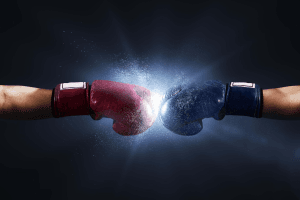
The physical abilities of fighters are noticed first, but mental strength truly determines victory in boxing matches. Every championship winner experienced fear, exhaustion, and doubt before continuing when others would surrender. In this sport, the mental game strikes more frequently than physical action.
Psychological Pressure in the Ring
All boxers experience the same nervousness before their first punch, including performance anxiety and the complete knowledge of falling from a single mistake. As in online casino real money betting and high-stakes gameplay, the nervousness evaluation process also impacts boxers who need to train beyond basic hitting techniques. The process involves mental preparation to withstand mental failure.
According to numerous sources, Olympian Floyd Mayweather Jr. reveals the mental chaos he faced before his unblemished victories. Mayweather used a combination of physical and psychological analysis against his future rivals to discover possible weak points. Mental strength combined with muscle makes up the complete fight composition.
What Is Mental Toughness in Boxing?
Humans should train their willpower through constant effort, which surpasses physical strength and reaches deeper into the human consciousness. These are the visible signs of mental toughness that boxers display inside their fight rings:
- To stay composed, a person can maintain mental focus under chaotic fights and noisy fans.
- Boxers endure severe injuries, ego hits, and exhaustion to continue fighting until the 12th round.
- The capacity to maintain strategic focus arises from remembering the battle plan during and after receiving a shock.
A fighter must control his ring performance through thoughts before transitioning to physical action.
How Fighters Use Mental Strength in Critical Moments
The fight continues despite the fighters’ trembling legs and blurry vision because they draw strength from beyond what training teaches them. The moment when a fighter’s willpower transforms everything is frequently examined by the Melbet community, who relive that precise instant. Some decisive moments in boxing demonstrate that quitting is insufficient for victory. The following section explores two historical boxing matches that showed how mindset control transformed the course of events.
Muhammad Ali’s Rope-a-Dope Strategy
Ali created a psychological labyrinth during his 1974 fight against George Foreman in Zaire, which extended beyond physical combat. Foreman possessed youth, unbeatable power, and undefeated dominance at the time. Ali watched while delivering mental attacks with his words, then waited patiently for his opportunity.
Foreman reached complete exhaustion during the eighth round of the match. Ali saw it. The champion ended his dominance after executing an expert sequence of attacks. Ali didn’t just win physically. Through his strategy, Ali disassembled the opponent, who thought his punches were ineffective.

Tyson Fury’s Comeback After Knockdown
December 1, 2018. Wilder vs. Fury. During the 12th round, Wilder struck an explosive uppercut that knocked Fury to the ground. Fury crashed down flat. Wilder struck with a brutal blow, followed by the scream of the spectators reverberating through the arena. Absolute impossibility struck when Fury got back to his feet. He rose toward victory in a methodical manner that resembled a person possessed.
Fury managed to rise from being knocked down and proceeded with a counterattack. Wilder tried to box against Fury during the remaining minutes of the round. The way Fury pulled himself up from that fall exceeded the boundaries of mere athletic competition. A resurrection of personal identity emerged because his inner determination refused to pass away.
Training the Mind Alongside the Body
You cannot inherit mental toughness from the fighting ring because it develops during preparation. During their training, boxers practice visualization while reproducing crowd noise and doing blindfolded exercises to maintain their composure during a disorder. Ultranationalist boxing champion Vasyl Lomachenko dedicated daily time to chess and memory games, which improved his fight-time decision-making abilities.
Modern society no longer views meditation practice as a form of weakness. During training sessions, Tyson Fury controls his emotional state through breathing exercises. When preparing for fights, Canelo Álvarez listens to music because he needs this pressure to simulate a match atmosphere. Boxers manifest their total control by surpassing their boundaries through physical pushups, mental silence, and focused concentration. When properly trained, the brain serves as an attacking instrument instead of being seen as a vulnerable point.
The Legacy of Mentally Strong Fighters
Their presence extends beyond creating records, since they establish detailed blueprints. Fans examine their matches to understand more than just the power of their punches, since they display perfect composure in every fight. A true gambler understands that a calm psyche leads to victory during highly stressful moments. A fighter with intense toughness does not necessarily secure victory during an encounter.




